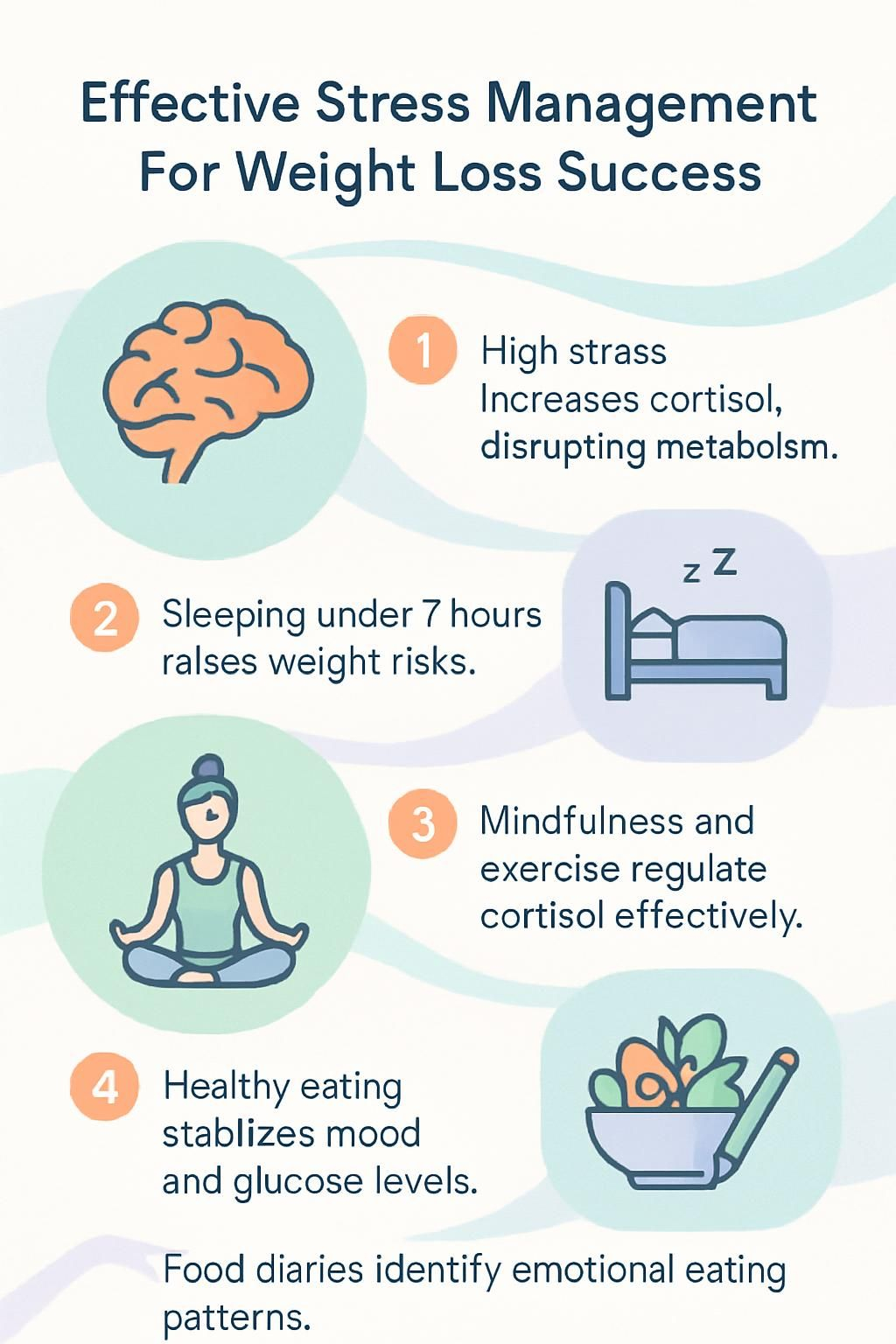Effective Stress Management For Weight Loss Success
Our Nutrition Assistant AI Suite will transform your body. You will lose fat, get toned, and build muscle. Gain confidence and optimal health.
Stress can make weight management feel like an uphill climb. If stress and weight loss seem linked for you, that is common. Studies show stress can change appetite, sleep, and how your body stores fat.
High stress raises cortisol, a stress hormone that shifts metabolism and hunger. Poor sleep and tense routines add to the problem. In this guide, you will learn why stress changes body weight, how to spot warning signs, and which stress management steps help you lose weight safely.
Keep reading for practical answers you can use today.
Key Takeaways
- High stress raises cortisol, which disrupts metabolism, increases cravings, and is linked with more belly fat, seen in studies like Pahk et al. 2023.
- Sleeping fewer than seven hours a night raises weight gain risk, and it upsets hunger hormones that control appetite.
- Mindfulness and regular aerobic exercise lower stress signals in the brain and help regulate cortisol for better weight management.
- Steady meals with complex carbs, fiber, and omega-3 fats help balance blood sugar while limiting mood swings and overeating.
- Food diaries reveal emotional eating triggers; see a professional if rapid weight shifts occur without lifestyle changes.

How Does Stress Affect Weight Loss?

Stress can shift your hormones, appetite, and energy use. Higher cortisol levels often lead to weight gain, a slower metabolism, and more fat around the waist.
How Does Cortisol Influence Weight Gain and Loss?
Cortisol is the stress hormone your adrenal glands release during pressure or worry. When cortisol stays high, blood sugar can rise and cravings for sugary or high-calorie foods often increase.
This shift encourages your body to store more fat, especially around your belly. Digestion can slow during stress, so your digestive system may not absorb nutrients as well.
Many people notice emotional eating, a stronger appetite, or irregular meals during hard times. These patterns can cause unintentional weight gain.
Long stretches of stress can change how your body handles food and fat. Extra energy tends to be stored as body fat around the abdomen. In rare medical cases like Cushing’s syndrome, very high cortisol causes severe weight gain and metabolic issues.
These hormone changes set the stage for shifts in appetite and metabolism.
In What Ways Does Stress Affect Appetite and Metabolism?
Stress triggers two key chemicals. Adrenaline speeds up the heart and can lower appetite for a short time. Cortisol has the opposite effect, driving cravings for fatty and sugary foods.
Anxiety can distract you from hunger, so some people skip meals and lose weight without meaning to. Others eat more for comfort, which raises calorie intake over time.
Stress can also affect the vagus nerve, a key nerve that helps control digestion. This may cause stomach pain, heartburn, constipation, or diarrhea. Poor nutrient absorption can lead to fatigue and unexpected weight loss.
Some people cope by moving more or fidgeting, which burns extra calories. A 2021 study found that about 40 percent of adults ate more during acute social stress, while another group skipped meals due to tension.
Positive Stress Effects on Weight Management
Short bursts of stress can briefly raise metabolism and change how your body uses fuel.
How Can Fight-or-Flight Responses Boost Metabolism?
In a fight-or-flight moment, adrenaline and cortisol flood the bloodstream. Adrenaline increases heart rate and metabolic rate. Your body uses more energy because it senses a threat.
Cortisol raises blood sugar to supply quick fuel to muscles. Appetite often drops during sudden stress, and some people lose a little weight. Extra movement or fidgeting during these times can burn additional calories.
These effects are temporary. If stress becomes chronic, appetite and metabolism usually swing in the other direction.
Why Does Stress Sometimes Reduce Appetite Short-Term?
During intense stress, adrenaline diverts blood away from digestion. Hunger fades while your body prepares for action. Many people skip meals or forget to eat when under pressure.
One 2018 study showed about 40 percent of people had a sharp drop in hunger because stress masked normal hunger cues. During college exams, I often noticed hours passed without eating because my stomach felt tight.
Some crave snacks when stressed, while others feel no desire to eat. Repeated missed meals can lead to slight weight loss if the pattern continues.
Stress can make you forget hunger even exists until your body reminds you with fatigue.
How Stress Creates Challenges for Weight Management
Stress can derail healthy routines. Over time, it can change your body weight and slow fat loss, even when you try hard to stay on track.
How Can Emotional Eating and Cravings Be Managed?
Emotional eating often follows chronic stress or tough feelings. A few steady habits can reduce cravings and protect your progress.
- Track triggers in a food diary to spot patterns, such as after work or during arguments.
- Practice deep breathing or mindfulness before meals to calm your system and reduce urge eating.
- Choose high-fiber snacks, fruit, or complex carbs to steady blood sugar and fullness.
- Drink water first if cravings hit and you are not truly hungry.
- Prioritize quality sleep to lower cortisol and cut next-day junk food cravings.
- Limit caffeine, which can raise cortisol and increase later cravings; swap extra coffee for herbal tea.
- See a health professional if emotional eating is frequent or feels out of control.
- Use healthy coping skills like meditation or moderate exercise instead of food for comfort.
- Set realistic goals and avoid extreme dieting or big calorie cuts.
- Celebrate small wins, such as one day without emotional eating.
Mindfulness meditation helped me choose healthier snacks during stressful weeks. The pause made the next choice easier.
What Is the Impact of Stress on Sleep and Hormones?
Stress raises cortisol, which keeps the brain alert and delays sleep. Poor sleep disrupts leptin and ghrelin, the hormones that control appetite, which may lead to more cravings for processed foods.
Insulin, which controls blood sugar, can also be affected. High cortisol with short sleep slows metabolism and promotes fat storage, especially around the abdomen.
Better sleep helps your body balance hormones and manage stress. That supports weight goals and steadier eating habits.
How Does Increased Cortisol Lead to Fat Storage?
Prolonged stress from grief, divorce, or illness can raise cortisol for weeks. Cortisol signals the liver to release more sugar into the blood. Over time, this encourages your body to store extra energy as visceral fat in the belly.
Cortisol also boosts a brain signal called neuropeptide Y, which increases cravings. Overeating becomes easier under stress. Long-term high cortisol is linked to obesity, insulin resistance, heart disease, and conditions like polycystic ovary syndrome.
Some medicines that increase cortisol can also promote weight gain. The pattern often includes more abdominal fat and a slower metabolism.
How Does Stress Affect Digestion and Nutrient Absorption?
Stress activates fight-or-flight, which diverts blood away from the digestive system. Your body prioritizes survival, so breaking down food and absorbing nutrients can slow.
High cortisol can delay stomach emptying, which may cause nausea or a heavy feeling. Stress can change gut movement, leading to bloating or diarrhea, common in irritable bowel syndrome or fibromyalgia.
Inflammation tends to rise under ongoing stress and may reduce vitamin and mineral absorption. During my most stressful months, normal meals sometimes caused stomach upsets, even without any change in diet.
Addressing stress can improve digestive comfort and support better weight and blood sugar control.
What Are the Signs of Stress-Related Weight Changes?
Stress can cause weight changes even when your diet and activity stay the same. Noticing early signs helps you respond sooner.
How to Recognize Sudden Weight Changes Without Lifestyle Changes?
Pay attention if clothes feel looser or tighter while your routine is stable. Track your weight weekly. A change of more than five percent in a few months can signal a problem.
Unintentional weight loss may point to health issues. Talk with your doctor if you see unexpected changes. During a stressful work stretch, I lost weight with no change in meals or exercise. Testing showed high cortisol, which can also affect growth signals like insulin-like growth factor 1.
Your clinician can help find the cause and suggest stress management steps or further tests.
Why Do Sleep Problems Persist Under Stress?
Cortisol tells your brain to stay alert. When levels run high at night, falling asleep is harder, and you may wake often. This cycle can persist while stress remains high.
If sleep trouble lasts more than one to two weeks, seek support. Many people find that regular exercise lowers stress and improves sleep quality.
Ongoing insomnia can disrupt leptin and ghrelin, which can slow your weight loss journey.
How Do Fatigue and Appetite Fluctuate with Stress?
Fatigue rises when stress drains energy. You may feel tired even after a full night in bed. When sleep is disrupted, daytime energy sinks, and workouts feel harder.
Appetite can swing both ways. Some people lose hunger, while others crave comfort foods. Rapid shifts can lead to weight loss or gain. Missing meals may also worsen fatigue.
What Stress Management Strategies Support Weight Loss?
Simple, steady habits help you lower stress and protect healthy routines. These strategies support weight loss and daily well-being.
How Can Mindfulness and Meditation Help Reduce Stress?
Mindfulness and meditation calm the mind and body. They help lower heart rate and cortisol and make emotional eating less likely.
- Spend five to ten minutes focusing on slow, even breaths each day.
- Try guided sessions with a free app or short online videos.
- Practice mindful eating, paying attention to flavor, smell, and texture.
- Write worries in a journal to clear mental clutter.
- Join a local or online group for support and consistency.
- Do a brief body scan before bed to relax and improve sleep.
- Ask a counselor for help if stress drives eating or mood shifts.
Next, add movement to multiply the benefits.
Why Is Regular Physical Activity Important for Stress Relief?
Exercise lowers activity in stress centers in the brain and reduces inflammation, as reported in recent research such as Pahk et al. Even a brisk walk or bike ride releases endorphins that ease anxiety.
Consistent exercise helps stabilize cortisol. That makes belly fat storage less likely. A short walk after a tense day often clears my mind and improves sleep.
Active routines support weight management and stress control at the same time.
How Does Quality Sleep Aid Weight Loss?
Quality sleep supports hormones that control hunger and stress, including cortisol, leptin, and ghrelin. Research from 2022 links fewer than seven hours of sleep with higher weight gain risk and slower fat loss.
Short sleep also weakens carbohydrate handling and insulin response, raising the chance of evening snacking. Better sleep improves appetite control, workout energy, and recovery.
If stress keeps you awake, talk with a clinician or therapist. Lasting sleep habits will help you manage stress and keep weight off.
What Are Healthy Eating Habits to Manage Stress?
Food choices can steady mood and energy during stressful times. Plan simple, regular meals to protect your focus and appetite.
- Use phone reminders so you do not skip meals.
- Eat every 3 to 4 hours to keep blood sugar steady.
- Include protein at meals and snacks to curb cravings.
- Add fiber from whole grains, fruits, vegetables, and nuts.
- Limit sugar and caffeine to prevent crashes and jitters.
- Pair protein and complex carbs after workouts to refuel.
- Drink water through the day to reduce fatigue.
- Cut back on processed snacks high in salt or unhealthy fats.
- Plan meals ahead on busy days to reduce decision stress.
Next, see which foods help calm stress and aid weight loss.
Which Foods Help Reduce Stress and Support Weight Loss?
Some foods support calmer moods and steadier energy. These choices help you manage stress and stay on track with weight goals.
What Are the Benefits of Complex Carbohydrates and Fiber?
Whole grains and other complex carbs can raise serotonin, a brain chemical that boosts mood. Fiber-rich foods like oats, beans, and vegetables slow digestion and keep blood sugar steady.
Regular small meals with whole grains offer lasting energy for daily activity. On stressful days, a bowl of oatmeal keeps me full much longer than a sweet pastry.
Fiber also supports healthy digestion, which helps your body absorb nutrients while under stress.
How Do Omega-3s Provide Anti-Inflammatory Effects?
Omega-3 fats reduce inflammation by limiting certain signaling molecules in the body. Salmon, tuna, walnuts, chia seeds, and flaxseeds are rich sources.
Harvard Health notes that omega-3 intake is associated with lower C-reactive protein, a marker of inflammation. Adding more omega-3 foods can support heart health and stress control.
When I ate salmon more often during exam season, I noticed less joint stiffness and better focus within two weeks. A typical serving of salmon provides a high amount of EPA and DHA, the most studied omega-3s.
Understanding how food affects mood makes it easier to pick smart carbs and fiber for calmer days.
Why Should Sugary and Processed Foods Be Avoided?
Limiting added sugar matters as much as adding healthy fats. Candy, sugary drinks, chips, fried foods, and many packaged snacks cause sharp blood sugar spikes then quick crashes.
These swings drive cravings, low energy, and overeating. Diets high in simple sugars can also raise cortisol.
During busy weeks, choosing fresh items from a grocery bar instead of vending snacks helped steady my appetite. Over time, fewer processed foods often means fewer cravings and a more stable metabolism.
How Does Exercise Help Reduce Stress and Aid Weight Loss?
Movement is a reliable stress reliever and a strong ally for weight control.
What Are the Benefits of Aerobic Exercise?
Aerobic activities like brisk walking, cycling, swimming, or dancing release endorphins, your brain’s natural stress fighters. Anxiety often eases after a single session.
Cardio can reduce cortisol and belly fat storage while burning calories and improving heart health. The CDC recommends at least 150 minutes of moderate-intensity activity per week for adults.
Energy and mood often improve quickly with consistent cardio.
How Can Resistance Training Manage Cortisol Levels?
Strength training helps manage cortisol and reduces stress. Research such as Pahk et al. suggests that combining strength and aerobic training is especially effective.
Two to three balanced sessions per week build and maintain muscle. More muscle supports a steady metabolism and fewer cortisol spikes. Many people also feel an emotional lift after lifting weights.
How Can Balanced Training Prevent Stress Build-Up?
Mixing cardio with strength work helps keep stress in check. This blend can lower cortisol and boost endorphins while improving sleep patterns.
For example, alternate brisk walks or cycling with light weight training three to five times weekly. The variety keeps workouts engaging and supports long-term well-being.
How to Add Relaxation Practices into Daily Life
Small daily practices can lower stress, protect routines, and support steady weight loss over time.
What Are Effective Deep Breathing Techniques?
Diaphragmatic breathing is a simple method. Sit upright, place a hand on your belly, and inhale through your nose for four counts until your stomach rises.
Hold for two counts. Exhale through your mouth for six counts. Repeat for five to ten breaths. This pattern can lower cortisol and calm the nervous system.
Box breathing is another option. Inhale for four, hold for four, exhale for four, pause for four, then repeat. These techniques fit anywhere, from your desk to a checkout line. Research shows deep breathing helps regulate stress responses.
How Does Progressive Muscle Relaxation Work?
Progressive muscle relaxation involves tensing and releasing muscle groups one at a time, from toes to head. This helps you notice hidden tension and then let it go.
Evidence shows it can reduce headaches, muscle soreness, and even high blood pressure. After deadline-heavy days, I would clench my fists for five seconds, then release. Relief arrived immediately, and my sleep improved over several weeks.
Lowering physical tension can also reduce cortisol spikes that drive cravings.
What Are the Benefits of Yoga and Tai Chi?
Yoga and tai chi combine gentle movement with mindful breathing. These practices improve flexibility, balance, and strength while calming the nervous system.
Regular practice is linked with lower cortisol and better sleep. If stress has pushed your weight up, a short online yoga session or a local tai chi class can help you feel centered and reduce emotional eating.
How to Stay Consistent with Stress Management
Consistency turns small actions into lasting habits. Simple tools can help you stay on track.
How Can You Set Reminders for Stress Relief Activities?
Use your phone, watch, or planner to schedule breathing breaks, short walks, and meals. Tools like Google Calendar and Apple Reminders make it easy to set repeating alerts.
Place sticky notes at your desk or fridge with cues like Take 5 to Breathe or Prep a Healthy Snack. These prompts support steady routines and reduce skipped activities.
What Creates a Supportive Environment for Stress Control?
After setting reminders, build a support team. Invite a friend or family member to walk with you or practice breathing after dinner. Keep healthy foods visible and move tempting snacks out of sight.
Share your goals so others can encourage you during stressful moments. Research in behavioral weight control shows people are more likely to succeed when support systems reinforce healthy habits.
In my case, a morning exercise buddy kept me committed on busy days. Shared routines made the new habits stick.
Wing RR et al., “Behavioral Weight Control: The State of the Evidence”, 2005.
How to Monitor Progress and Celebrate Successes?
Track your weight, mood, and stress levels weekly in a journal or app. Use simple charts to spot trends. Mark small wins, such as one week without stress eating or seven straight days of walks.
Celebrate with healthy rewards like a new workout shirt or a special meal that fits your plan. Notice how better sleep or lower stress changes your energy. Share progress with supportive people to keep motivation high.
When Should You Seek Professional Help for Chronic Stress?
Chronic stress raises health risks and can stall weight loss. Professional help can speed relief and protect your well-being.
When to Consult Healthcare Providers About Stress?
Unintentional weight loss of more than five percent over 6 to 12 months deserves a medical check. For example, if you weigh 160 pounds and lose over 8 pounds without trying, call your doctor.
Ongoing headaches, chest pain, or constant anxiety are also reasons to seek care. Using alcohol or medications to cope signals the need for support.
A friend of mine had frequent headaches and weight loss with no routine changes. Her primary care clinician identified severe stress as the main cause.
How Can Therapists or Counselors Assist with Stress?
Therapists teach skills to manage stress, cravings, and mood shifts. After a major life change, they can help you understand new patterns and reduce emotional eating.
In sessions, you may track feelings, practice mindful breathing, and learn cognitive-behavioral tools that fit your lifestyle. After several stressful events led to late-night snacking, my counselor taught me to pause, name triggers, and choose a better option.
If you feel stuck, a therapist can help you move forward and maintain progress.
What Are Stress Management Programs and When to Consider Them?
Structured programs combine mindfulness, exercise plans, nutrition, and therapy. They help when self-guided steps are not enough, especially with long-term sleep problems, emotional eating, or weight changes that affect daily life.
Consistent support builds skills and routines that make stress easier to handle.
Conclusion
Stress management supports healthy weight loss. Calmer days help control appetite, balance cortisol, and protect your metabolism. Good sleep, active movement, and mindful eating work together to reduce stress effects on your body.
Watch for signs like sudden weight changes or stubborn insomnia, and seek help when needed. This article is for education, not medical advice. Partner with a clinician for personal guidance. With steady stress management, weight control gets easier and your health improves.
FAQs
1. How does stress affect weight loss efforts?
Stress can raise cortisol levels, which may increase appetite and cravings for high-calorie foods. Research shows that people under stress often choose foods with more sugar and fat. This can slow weight loss progress and make it harder to stick to healthy eating plans.
2. What are some proven stress management techniques that support weight loss?
Deep breathing, regular exercise, and mindfulness practices like meditation help lower stress. Studies show that people who use these methods report fewer cravings and better control over their eating habits. Keeping a journal to track emotions and triggers can also support healthy choices.
3. Can stress management improve long-term weight loss success?
Yes, managing stress helps people maintain healthy routines over time. Data from clinical trials suggest that those who practice stress reduction are more likely to keep weight off after losing it. Consistent stress control supports better sleep and energy levels, which play a role in weight maintenance.
4. How can I apply stress management in my daily life for weight loss?
Start with small steps such as taking short walks or practicing deep breathing before meals. Set aside a few minutes each day for relaxation or reflection. For example, I found that writing down my worries before bed helped me sleep better and avoid late-night snacking. These habits can make weight loss goals easier to reach.
Summary: Stress can slow weight loss by raising cortisol and increasing cravings. Using proven techniques like exercise and mindfulness can help manage stress and support lasting weight loss. Small daily actions can make a big difference in reaching and maintaining a healthy weight.







